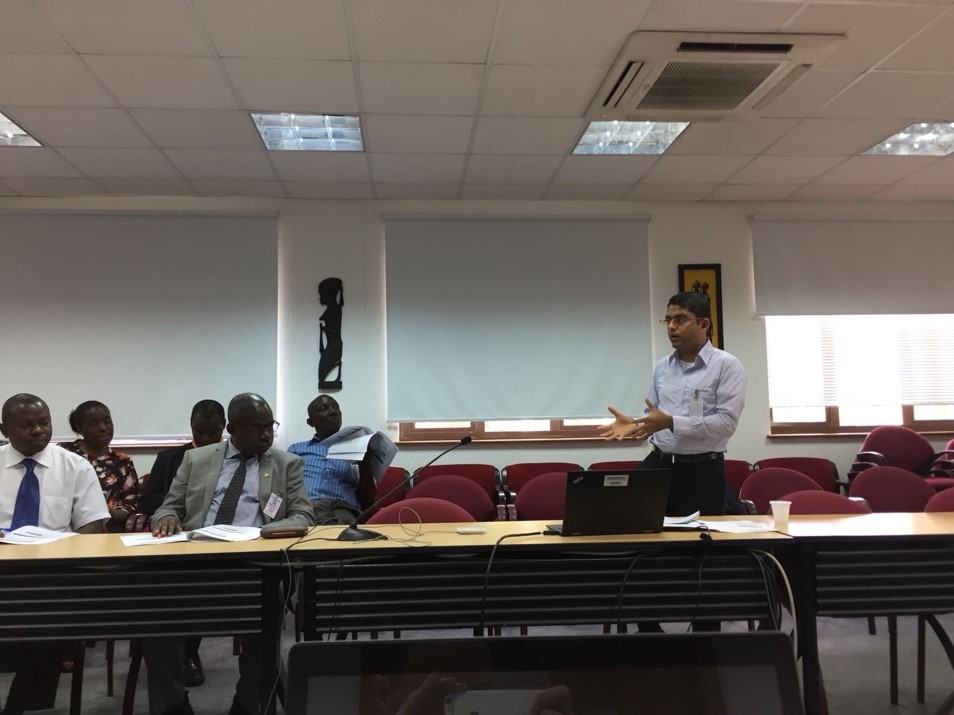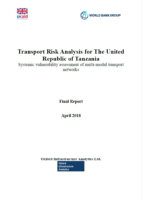This work has been funded by the Corridors for Growth Multi-donor Trust Fund, administered by the World Bank, with the support of UK Aid
Researchers expose how climate change will impact Tanzania’s transport systems with knock-on risks for the economy and access to basic services.
Tanzania’s transport infrastructure is under growing pressure. The country’s high economic growth over the last decade (6-7% a year) has increased usage of the country’s transport network but it faces growing risks to its vital communications arteries. Flooding from rainfall and overflowing rivers already disrupts trade flows and passenger, but these risks are expected to further increase with climate change.
UK Aid and World Bank funded the team from the Infrastructure Transitions Research Consortium (ITRC) to investigate the impact of current and future flooding on the country’s roads, railways, inland and coastal shipping and aviation networks, that are integral to Tanzania and East African regional connectivity.
The report Transport Risks Analysis for The United Republic of Tanzania for the Government of The United Republic of Tanzania and The World Bank is now available.
ITRC is already rolling out this unique methodology across the world, further advancing the methodology and datasets in similar studies in Vietnam and Argentina.
The Tanzania study provides a number of important new lessons for policy makers:
- The study mapped critical vulnerabilities and risks to Tanzania’s transport systems.
- The analysis provides policy-makers in Tanzania, The World Bank and the East African region with the rationale for prioritizing investments to reduce vulnerability and build systemic resilience, forming the basis for long-term adaptation planning.
- The study also highlights the consequences of current and future flooding for the surrounding countries with cross-border transport links through major transport corridors that traverse Tanzania.
Senior researcher, Dr Elco Koks, at the Infrastructure Transitions Research Consortium (ITRC) at the University of Oxford, explains, “This study and modelling are vitally important because approaches like this help to plan for long-term, resilient infrastructures able to withstand the impacts of climate hazards, avoiding devastating effects in the most vulnerable areas.
Furthermore, by mapping population concentrations and their access to essential services such as healthcare facilities, the study provides evidence of the climate risks that threaten the people of Tanzania, and illustrate where these risks need to be tackled if Tanzania is to meet the UN’s Sustainable Development Goals.”
Severe economic consequences from transport disruption
ITRC researchers created the first ever geospatial road, rail, port and airport multi-modal transport model of freight flows in The United Republic of Tanzania. The unique model was subsequently used to identify transport disruptions due to flooding, and their wider economic impacts. The study also scrutinized the key transport developments planned over the next decades and how climate-change driven extreme floods could affect these future developments.
Transport infrastructure also plays a vital role in providing access to health services and the study identified particular hotspots of potential inaccessibility where investments in road maintenance and upgrading could help ensure significant health services remain accessible during severe flooding.
ITRC researcher Dr Raghav Pant, who was the project Lead, explains, “ITRC’s modelling shows that there is a strong case for investment in the transport network of The United Republic of Tanzania to reduce its vulnerability to flood risks. The analysis has demonstrated that the network is not resilient to climate-related hazards. We have estimated that worst-case transport network disruption has the potential to cause USD 1.4 million per day at present, potentially increasing to USD 2.5 million per day in future.
He adds, “Such a detailed modelling of transport networks and risk assessment for The United Republic of Tanzania has not previously been undertaken; it provides detailed evidence of potential systemic vulnerabilities. This study is a blueprint that can be rollout to many other countries, and not necessarily only developing countries.”

Oxford team members Dr. Raghav Pant, Dr. Elco Koks in Dar es Salaam in October 2017 introducing their project to the World Bank and Government of Tanzania officials.
ITRC’s modelling shows that there is a strong case for investment in the transport network of The United Republic of Tanzania to reduce its vulnerability to flood risks. The analysis has demonstrated that the network is not resilient to climate-related hazards.
Project duration:
May 2017 – April 2018
Institutions:
University of Oxford-led Infrastructure Transitions Research Consortium (ITRC)

Koks, Elco & Pant, Raghav. (2018). Transport Risks Analysis for The United Republic of Tanzania – Systemic vulnerability assessment of multi-modal transport networks. 10.13140/RG.2.2.25497.26722.



